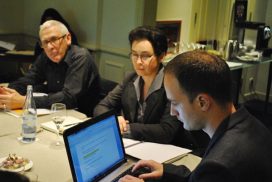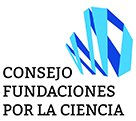The launch of the book Competing interests in biomedical publications (a guide for editors, reviewers and authors) was held on December 13th at the Palauet in Barcelona. Speaking at the launch was the two coordinators of the book. Ana Marušić is the Chair of the Department of Research in Biomedicine and Health at University of Split School of Medicine, in Croatia and the Co-editor in Chief of Journal of Global Health. She is past President of the Council of Science Editors and past-president of the World Association of Medical Editors.
Harvey Marcovitch was Consultant paediatrician in the UK, editor ofArchives of Disease in Childhood and also editor on BMJ Publishing Group. He is now member of the editorial committee of Clinical Risk (from the Royal Society of Medicine Press), and former chairman of the Committee on Publication Ethics. His current post is as chairman of the Medical Practitioners’ Tribunal Service Fitness to Practice Panels, which ear allegations against physicians.
Also Annette Flanagin, Managing Deputy Editor for JAMA, invited the audience to participate at the next Seventh International Congress on Peer Review and Biomedical Publication.
Each year brings to light several cases of scientific fraud. In 2011, the Netherlands Academy of Sciences struck off a renowned social psychologist who had falsified the results in several of his articles published in respected journals such as Science. He was one of the most notorious cases, on the heels of another scandal two years earlier when a respected U.S. scientist in multimodal analgesia apparently manipulated data in at least 20 articles published since 1996.
These are extreme cases, and the harm caused to patients and public health, they say, is limited. However, there are other types of misconduct in the field of scientific research that are more widespread, subtle and difficult to detect. These include practices such as selective publication of data to support a previous hypothesis, biased discussion, the hiring of ghostwriters, plagiarism or the temptation of some journal editors to promote the articles with positive results.
The publication is intended as a useful tool for readers, authors and editors of scientific journals, and for those who are interested to preserving the integrity of scientific knowledge. A collection of a wide range of resources for combating bad practices in biomedical publication, the book addresses conflict of interest as a factor that may have a significant adverse effect on the field of research. And although findings of malpractice are less serious than the falsification or fabrication of data, cumulatively their damage on scientific knowledge can be greater than that of the most notorious cases.














